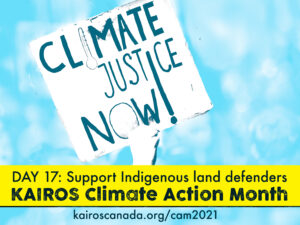Indigenous resistance against carbon #KAIROSClimateAction

“Advocacy and direct action by Indigenous Peoples in opposition to threats to lands, waters, air, and future generations are not optional measures by those that adhere and live by traditional Indigenous knowledge. They are obligations.”
Indigenous Resistance Against Carbon, 2021
The Indigenous Environmental Network and Oil Change International released a report earlier this month called Indigenous Resistance Against Carbon. The report examines over two dozen fossil fuel fights on Turtle Island (so-called United States and Canada), including ongoing struggles and successes, finding that Indigenous resistance adds up to 1.8 billion metric tons CO2e.
The report also calculated the potential impact of ongoing struggles concluding that if these “struggles prove successful, this would mean Indigenous resistance will have stopped greenhouse gas pollution equivalent to nearly one-quarter (24 percent) of annual total U.S. and Canadian emissions.” This is the equivalent pollution of approximately 400 new coal-fired power plants or taking 345 million passenger cars off the road.
This impact is significant but also comes at a significant cost to the safety and wellbeing of Indigenous land defenders. The report details the threats and violence faced by Indigenous peoples as part of the Dakota Access Pipeline resistance, noting it not as an isolated incident but rather a commonality of all Indigenous land defense worldwide. Indigenous land defenders in so-called Canada, including the Tiny House Warriors in Secwepemc territory and those at the blockades in Wet’suwet’en territory have also faced verbal and physical attacks.
Furthermore, Indigenous land defenders face legal challenges and are criminalized for occupying their land and for simply exercising their inherent right to self-determination.
In an article from 2020, KAIROS notes, “The criminalization and stigmatization of land defense is a recurring pattern across the region. Land and water protectors, especially women, are regularly deemed “anti-development,” “radicals,” and even “terrorists.” For their efforts, some land defenders are ostracized from their communities while others face the additional risk of being physically threatened and attacked by state and non-state actors. Front Line Defenders and Global Witness have expressed concern over the number of killings of human rights defenders working on the intersection of Indigenous rights and the environment across the globe.”
Day of ACTION!
For today’s action, we invite you to support Indigenous land defenders opposing threats to lands, waters, air, and future generations. Here are some organizations that you can support financially or through acts of solidarity:
- Raven Trust: raises legal defence funds for Indigenous Peoples in Canada to defend their rights and the integrity of lands and cultures.
- Tiny House Warriors: land defense to stop the Trans Mountain pipeline from crossing unceded Secwepemc Territory.
- The Rainforest Flying Squad: grassroots, non-violent direct-action movement committed to protecting the last stands of globally significant ancient temperate rainforest on Vancouver Island.
- Niitsitapi Water Protectors: a grassroots collective of Niitsítapi water and land protectors to protect the water and land within the traditional and treaty lands of the Blackfoot Confederacy.
- Stop Alton Gas: grassroots Mi’kmaq and non-Indigenous resistance to Alton Gas projects on the Shubenacadie River








